Critical Review: IOM Report & its impact on the Future of Nursing
VerifiedAdded on 2023/05/28
|5
|1215
|140
Report
AI Summary
This report provides a review of the Institute of Medicine (IOM) report, "The Future of Nursing: Leading Change, Advancing Health," focusing on its key messages and implications for nursing education, leadership, and practice. The review summarizes the four main messages of the IOM report, emphasizing the need for nurses to practice to the full extent of their education, achieve higher levels of education, partner with other healthcare professionals, and improve data collection and information infrastructure. It discusses the influence of the IOM report on nursing education and leadership, the benefits of BSN-prepared nurses, the evolving role of nurses and education, the significance of professional development, and how nurses can assist in managing patients within the evolving healthcare system by focusing on prevention, patient-centered care, and coordination with other specialists. The report concludes that transforming nursing roles and education is crucial for meeting the needs of American patients and improving the quality of care.
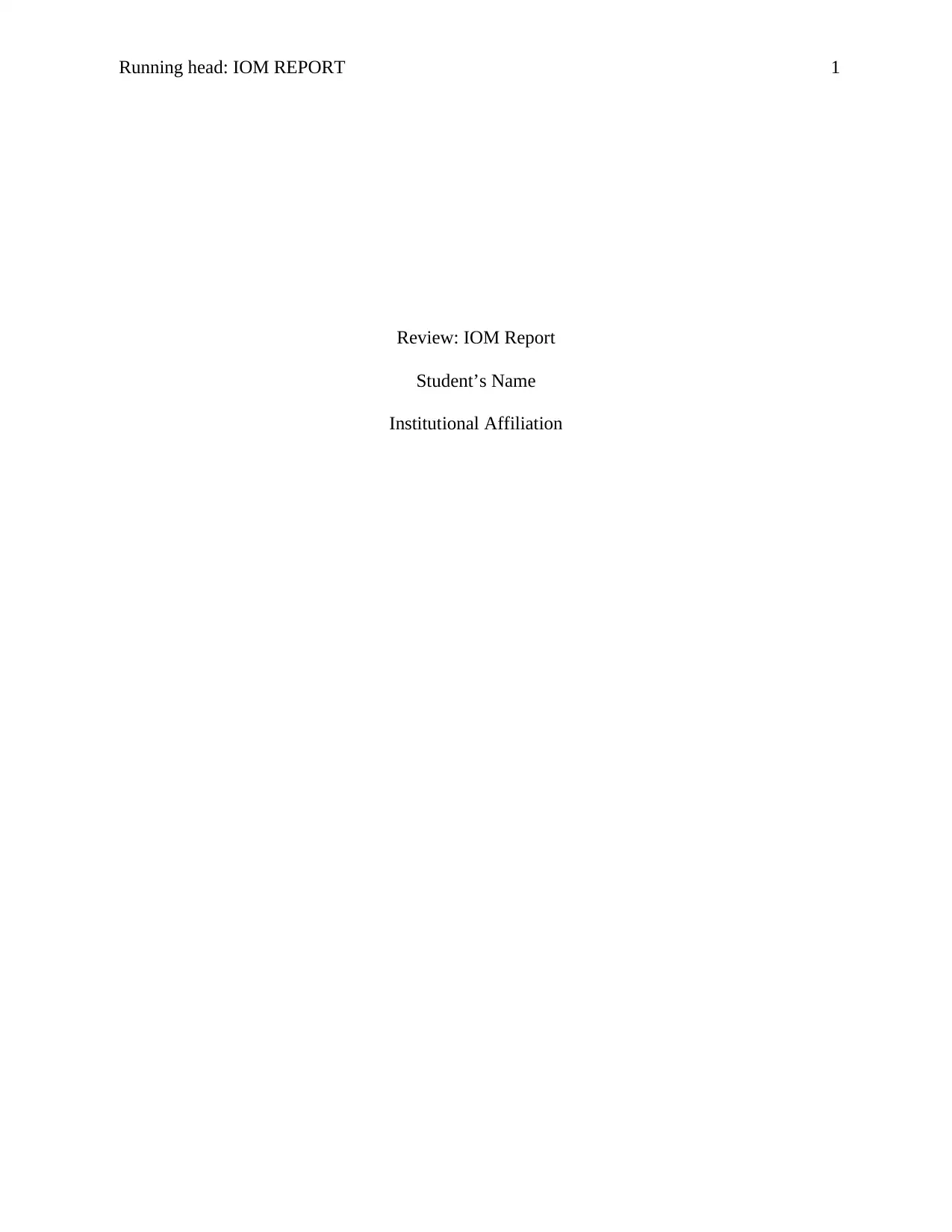
Running head: IOM REPORT 1
Review: IOM Report
Student’s Name
Institutional Affiliation
Review: IOM Report
Student’s Name
Institutional Affiliation
Paraphrase This Document
Need a fresh take? Get an instant paraphrase of this document with our AI Paraphraser
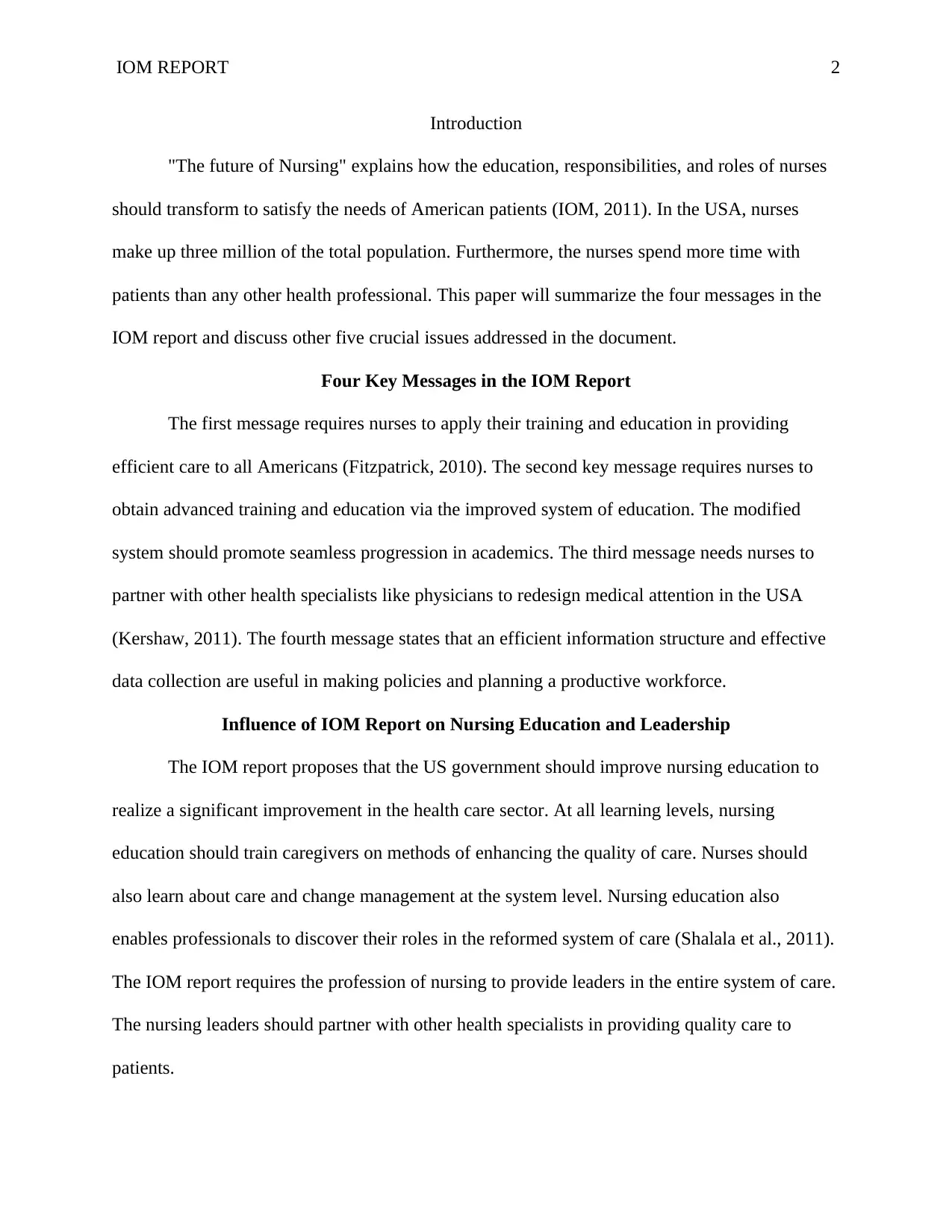
IOM REPORT 2
Introduction
"The future of Nursing" explains how the education, responsibilities, and roles of nurses
should transform to satisfy the needs of American patients (IOM, 2011). In the USA, nurses
make up three million of the total population. Furthermore, the nurses spend more time with
patients than any other health professional. This paper will summarize the four messages in the
IOM report and discuss other five crucial issues addressed in the document.
Four Key Messages in the IOM Report
The first message requires nurses to apply their training and education in providing
efficient care to all Americans (Fitzpatrick, 2010). The second key message requires nurses to
obtain advanced training and education via the improved system of education. The modified
system should promote seamless progression in academics. The third message needs nurses to
partner with other health specialists like physicians to redesign medical attention in the USA
(Kershaw, 2011). The fourth message states that an efficient information structure and effective
data collection are useful in making policies and planning a productive workforce.
Influence of IOM Report on Nursing Education and Leadership
The IOM report proposes that the US government should improve nursing education to
realize a significant improvement in the health care sector. At all learning levels, nursing
education should train caregivers on methods of enhancing the quality of care. Nurses should
also learn about care and change management at the system level. Nursing education also
enables professionals to discover their roles in the reformed system of care (Shalala et al., 2011).
The IOM report requires the profession of nursing to provide leaders in the entire system of care.
The nursing leaders should partner with other health specialists in providing quality care to
patients.
Introduction
"The future of Nursing" explains how the education, responsibilities, and roles of nurses
should transform to satisfy the needs of American patients (IOM, 2011). In the USA, nurses
make up three million of the total population. Furthermore, the nurses spend more time with
patients than any other health professional. This paper will summarize the four messages in the
IOM report and discuss other five crucial issues addressed in the document.
Four Key Messages in the IOM Report
The first message requires nurses to apply their training and education in providing
efficient care to all Americans (Fitzpatrick, 2010). The second key message requires nurses to
obtain advanced training and education via the improved system of education. The modified
system should promote seamless progression in academics. The third message needs nurses to
partner with other health specialists like physicians to redesign medical attention in the USA
(Kershaw, 2011). The fourth message states that an efficient information structure and effective
data collection are useful in making policies and planning a productive workforce.
Influence of IOM Report on Nursing Education and Leadership
The IOM report proposes that the US government should improve nursing education to
realize a significant improvement in the health care sector. At all learning levels, nursing
education should train caregivers on methods of enhancing the quality of care. Nurses should
also learn about care and change management at the system level. Nursing education also
enables professionals to discover their roles in the reformed system of care (Shalala et al., 2011).
The IOM report requires the profession of nursing to provide leaders in the entire system of care.
The nursing leaders should partner with other health specialists in providing quality care to
patients.
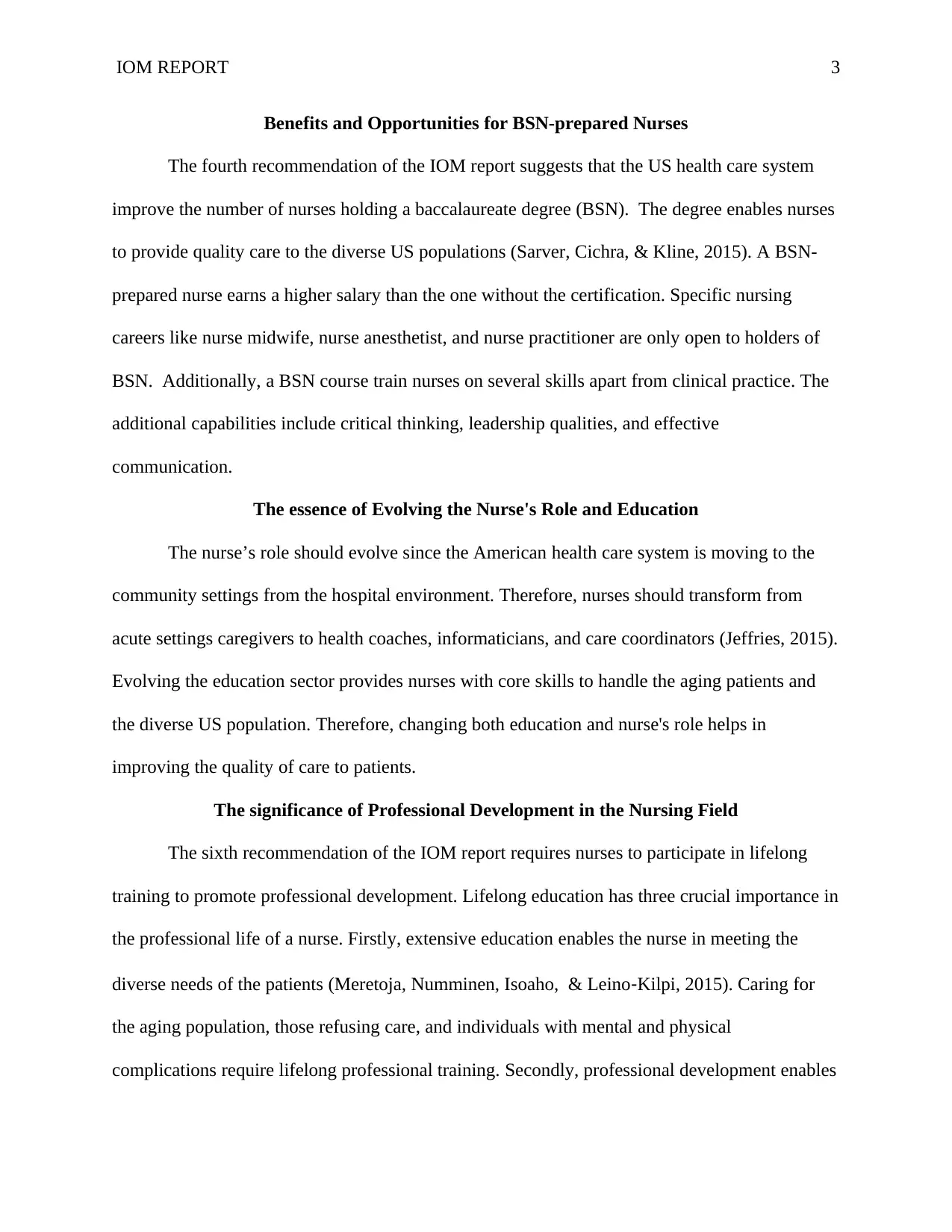
IOM REPORT 3
Benefits and Opportunities for BSN-prepared Nurses
The fourth recommendation of the IOM report suggests that the US health care system
improve the number of nurses holding a baccalaureate degree (BSN). The degree enables nurses
to provide quality care to the diverse US populations (Sarver, Cichra, & Kline, 2015). A BSN-
prepared nurse earns a higher salary than the one without the certification. Specific nursing
careers like nurse midwife, nurse anesthetist, and nurse practitioner are only open to holders of
BSN. Additionally, a BSN course train nurses on several skills apart from clinical practice. The
additional capabilities include critical thinking, leadership qualities, and effective
communication.
The essence of Evolving the Nurse's Role and Education
The nurse’s role should evolve since the American health care system is moving to the
community settings from the hospital environment. Therefore, nurses should transform from
acute settings caregivers to health coaches, informaticians, and care coordinators (Jeffries, 2015).
Evolving the education sector provides nurses with core skills to handle the aging patients and
the diverse US population. Therefore, changing both education and nurse's role helps in
improving the quality of care to patients.
The significance of Professional Development in the Nursing Field
The sixth recommendation of the IOM report requires nurses to participate in lifelong
training to promote professional development. Lifelong education has three crucial importance in
the professional life of a nurse. Firstly, extensive education enables the nurse in meeting the
diverse needs of the patients (Meretoja, Numminen, Isoaho, & Leino‐Kilpi, 2015). Caring for
the aging population, those refusing care, and individuals with mental and physical
complications require lifelong professional training. Secondly, professional development enables
Benefits and Opportunities for BSN-prepared Nurses
The fourth recommendation of the IOM report suggests that the US health care system
improve the number of nurses holding a baccalaureate degree (BSN). The degree enables nurses
to provide quality care to the diverse US populations (Sarver, Cichra, & Kline, 2015). A BSN-
prepared nurse earns a higher salary than the one without the certification. Specific nursing
careers like nurse midwife, nurse anesthetist, and nurse practitioner are only open to holders of
BSN. Additionally, a BSN course train nurses on several skills apart from clinical practice. The
additional capabilities include critical thinking, leadership qualities, and effective
communication.
The essence of Evolving the Nurse's Role and Education
The nurse’s role should evolve since the American health care system is moving to the
community settings from the hospital environment. Therefore, nurses should transform from
acute settings caregivers to health coaches, informaticians, and care coordinators (Jeffries, 2015).
Evolving the education sector provides nurses with core skills to handle the aging patients and
the diverse US population. Therefore, changing both education and nurse's role helps in
improving the quality of care to patients.
The significance of Professional Development in the Nursing Field
The sixth recommendation of the IOM report requires nurses to participate in lifelong
training to promote professional development. Lifelong education has three crucial importance in
the professional life of a nurse. Firstly, extensive education enables the nurse in meeting the
diverse needs of the patients (Meretoja, Numminen, Isoaho, & Leino‐Kilpi, 2015). Caring for
the aging population, those refusing care, and individuals with mental and physical
complications require lifelong professional training. Secondly, professional development enables
⊘ This is a preview!⊘
Do you want full access?
Subscribe today to unlock all pages.

Trusted by 1+ million students worldwide
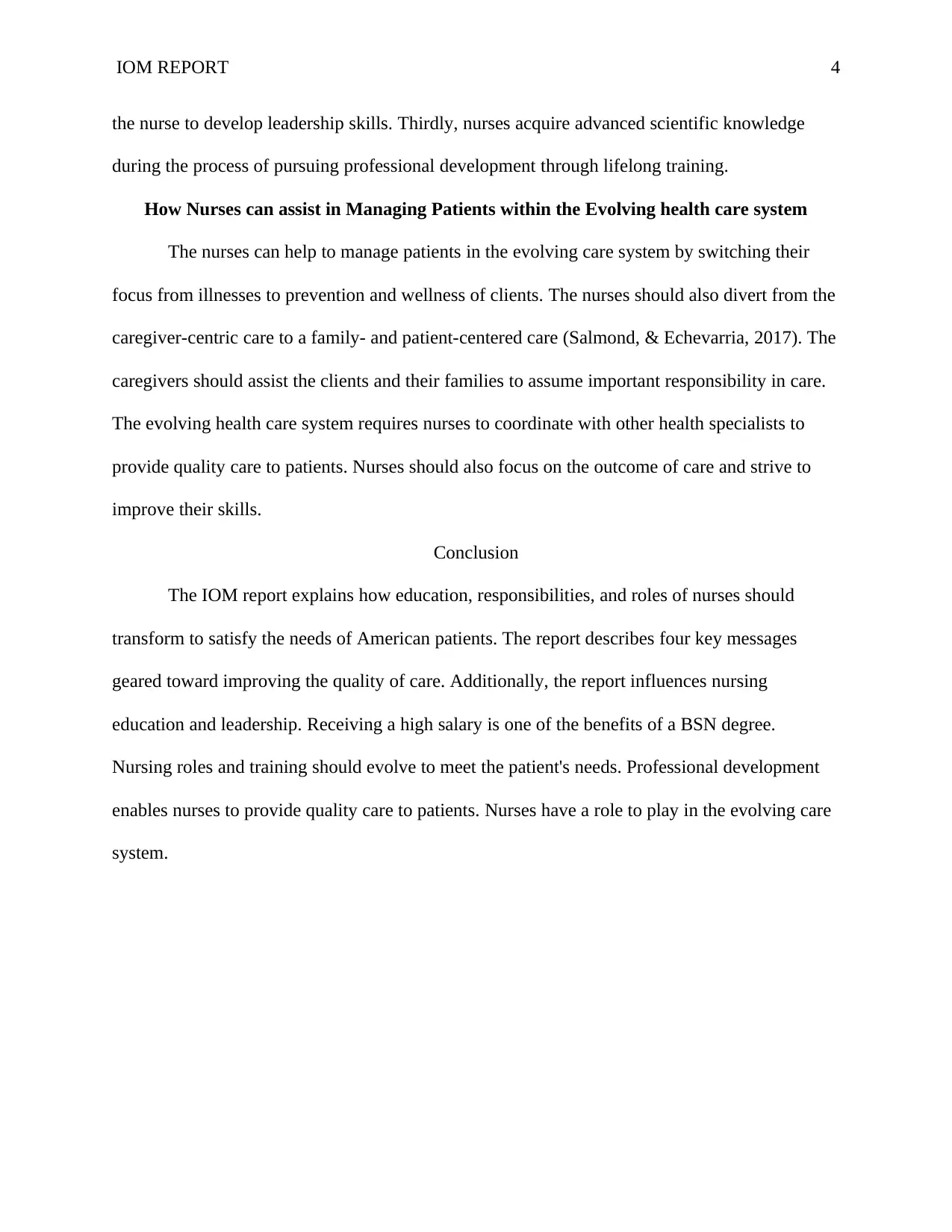
IOM REPORT 4
the nurse to develop leadership skills. Thirdly, nurses acquire advanced scientific knowledge
during the process of pursuing professional development through lifelong training.
How Nurses can assist in Managing Patients within the Evolving health care system
The nurses can help to manage patients in the evolving care system by switching their
focus from illnesses to prevention and wellness of clients. The nurses should also divert from the
caregiver-centric care to a family- and patient-centered care (Salmond, & Echevarria, 2017). The
caregivers should assist the clients and their families to assume important responsibility in care.
The evolving health care system requires nurses to coordinate with other health specialists to
provide quality care to patients. Nurses should also focus on the outcome of care and strive to
improve their skills.
Conclusion
The IOM report explains how education, responsibilities, and roles of nurses should
transform to satisfy the needs of American patients. The report describes four key messages
geared toward improving the quality of care. Additionally, the report influences nursing
education and leadership. Receiving a high salary is one of the benefits of a BSN degree.
Nursing roles and training should evolve to meet the patient's needs. Professional development
enables nurses to provide quality care to patients. Nurses have a role to play in the evolving care
system.
the nurse to develop leadership skills. Thirdly, nurses acquire advanced scientific knowledge
during the process of pursuing professional development through lifelong training.
How Nurses can assist in Managing Patients within the Evolving health care system
The nurses can help to manage patients in the evolving care system by switching their
focus from illnesses to prevention and wellness of clients. The nurses should also divert from the
caregiver-centric care to a family- and patient-centered care (Salmond, & Echevarria, 2017). The
caregivers should assist the clients and their families to assume important responsibility in care.
The evolving health care system requires nurses to coordinate with other health specialists to
provide quality care to patients. Nurses should also focus on the outcome of care and strive to
improve their skills.
Conclusion
The IOM report explains how education, responsibilities, and roles of nurses should
transform to satisfy the needs of American patients. The report describes four key messages
geared toward improving the quality of care. Additionally, the report influences nursing
education and leadership. Receiving a high salary is one of the benefits of a BSN degree.
Nursing roles and training should evolve to meet the patient's needs. Professional development
enables nurses to provide quality care to patients. Nurses have a role to play in the evolving care
system.
Paraphrase This Document
Need a fresh take? Get an instant paraphrase of this document with our AI Paraphraser
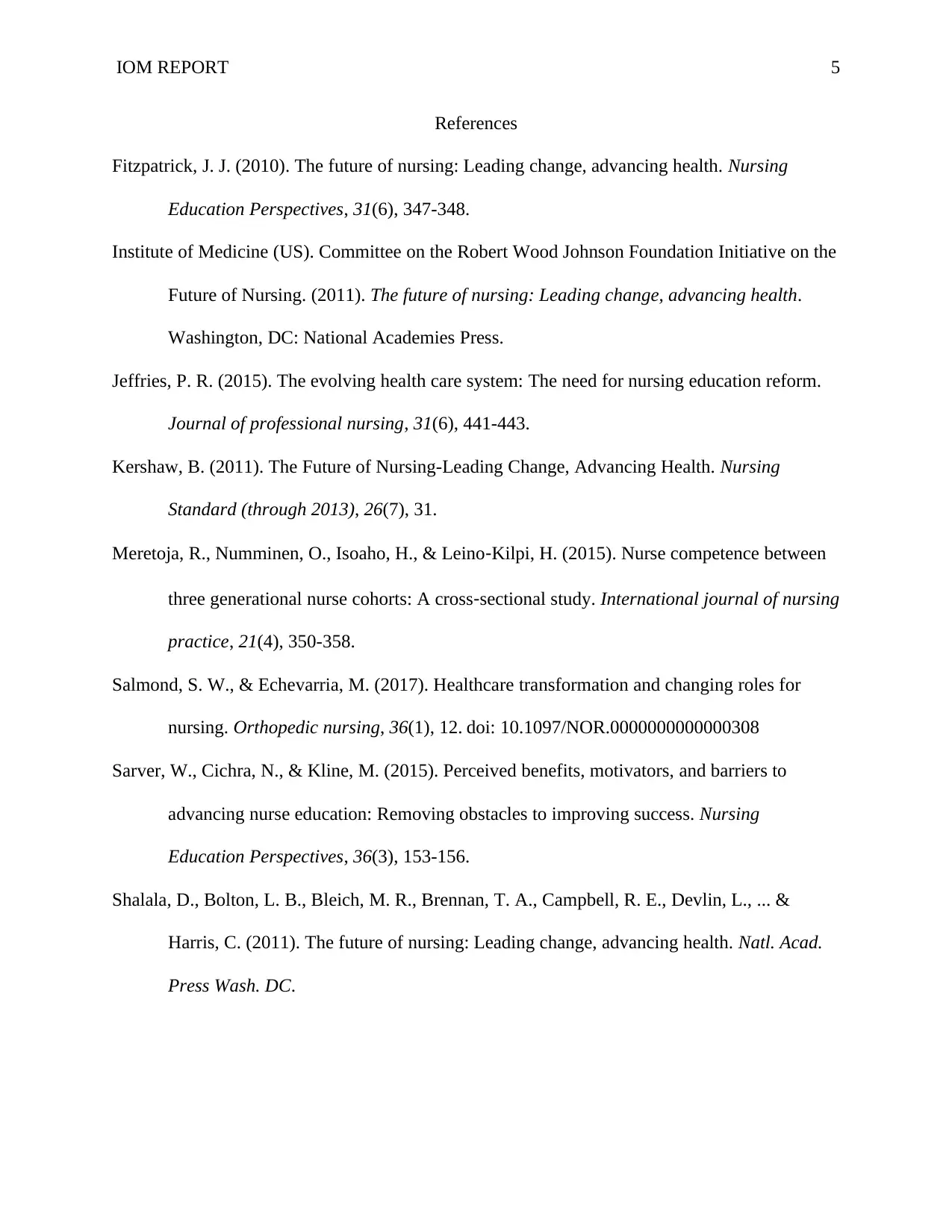
IOM REPORT 5
References
Fitzpatrick, J. J. (2010). The future of nursing: Leading change, advancing health. Nursing
Education Perspectives, 31(6), 347-348.
Institute of Medicine (US). Committee on the Robert Wood Johnson Foundation Initiative on the
Future of Nursing. (2011). The future of nursing: Leading change, advancing health.
Washington, DC: National Academies Press.
Jeffries, P. R. (2015). The evolving health care system: The need for nursing education reform.
Journal of professional nursing, 31(6), 441-443.
Kershaw, B. (2011). The Future of Nursing-Leading Change, Advancing Health. Nursing
Standard (through 2013), 26(7), 31.
Meretoja, R., Numminen, O., Isoaho, H., & Leino‐Kilpi, H. (2015). Nurse competence between
three generational nurse cohorts: A cross‐sectional study. International journal of nursing
practice, 21(4), 350-358.
Salmond, S. W., & Echevarria, M. (2017). Healthcare transformation and changing roles for
nursing. Orthopedic nursing, 36(1), 12. doi: 10.1097/NOR.0000000000000308
Sarver, W., Cichra, N., & Kline, M. (2015). Perceived benefits, motivators, and barriers to
advancing nurse education: Removing obstacles to improving success. Nursing
Education Perspectives, 36(3), 153-156.
Shalala, D., Bolton, L. B., Bleich, M. R., Brennan, T. A., Campbell, R. E., Devlin, L., ... &
Harris, C. (2011). The future of nursing: Leading change, advancing health. Natl. Acad.
Press Wash. DC.
References
Fitzpatrick, J. J. (2010). The future of nursing: Leading change, advancing health. Nursing
Education Perspectives, 31(6), 347-348.
Institute of Medicine (US). Committee on the Robert Wood Johnson Foundation Initiative on the
Future of Nursing. (2011). The future of nursing: Leading change, advancing health.
Washington, DC: National Academies Press.
Jeffries, P. R. (2015). The evolving health care system: The need for nursing education reform.
Journal of professional nursing, 31(6), 441-443.
Kershaw, B. (2011). The Future of Nursing-Leading Change, Advancing Health. Nursing
Standard (through 2013), 26(7), 31.
Meretoja, R., Numminen, O., Isoaho, H., & Leino‐Kilpi, H. (2015). Nurse competence between
three generational nurse cohorts: A cross‐sectional study. International journal of nursing
practice, 21(4), 350-358.
Salmond, S. W., & Echevarria, M. (2017). Healthcare transformation and changing roles for
nursing. Orthopedic nursing, 36(1), 12. doi: 10.1097/NOR.0000000000000308
Sarver, W., Cichra, N., & Kline, M. (2015). Perceived benefits, motivators, and barriers to
advancing nurse education: Removing obstacles to improving success. Nursing
Education Perspectives, 36(3), 153-156.
Shalala, D., Bolton, L. B., Bleich, M. R., Brennan, T. A., Campbell, R. E., Devlin, L., ... &
Harris, C. (2011). The future of nursing: Leading change, advancing health. Natl. Acad.
Press Wash. DC.
1 out of 5
Related Documents
Your All-in-One AI-Powered Toolkit for Academic Success.
+13062052269
info@desklib.com
Available 24*7 on WhatsApp / Email
![[object Object]](/_next/static/media/star-bottom.7253800d.svg)
Unlock your academic potential
Copyright © 2020–2026 A2Z Services. All Rights Reserved. Developed and managed by ZUCOL.





